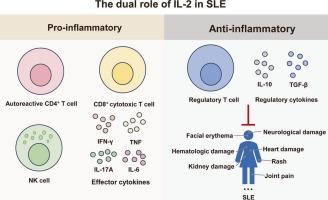The dual role of IL-2 in systemic lupus erythematosus: balancing pro-inflammatory and anti-inflammatory effects
IF 3.7
3区 医学
Q2 BIOCHEMISTRY & MOLECULAR BIOLOGY
引用次数: 0
Abstract
Systemic lupus erythematosus (SLE) is a complex autoimmune disease characterized by chronic inflammation and immune dysregulation. Interleukin-2 (IL-2), a central cytokine in T-cell biology, plays a paradoxical role in SLE pathogenesis. On one hand, it promotes effector T cell and natural killer (NK) cell activity, thereby amplifying inflammation; on the other, it supports the expansion and function of regulatory T cells (Tregs), which are essential for maintaining immune tolerance. This dual functionality makes IL-2 a driver of autoimmunity and a potential immunotherapeutic target. This review outlines the molecular mechanisms underlying IL-2's pro- and anti-inflammatory roles in SLE, highlights the regulatory factors that shape its functional balance, such as receptor affinity, dosing, exposure duration, and the immune microenvironment, and discusses recent progress in low-dose IL-2therapy and engineered IL-2 variants. A comprehensive understanding of IL-2 signaling dynamics is essential for the designing development of precision therapies designed to restore immune homeostasis in SLE.

IL-2在系统性红斑狼疮中的双重作用:平衡促炎和抗炎作用。
系统性红斑狼疮(SLE)是一种以慢性炎症和免疫失调为特征的复杂自身免疫性疾病。白细胞介素-2 (IL-2)是t细胞生物学中的中心细胞因子,在SLE发病机制中起着矛盾的作用。一方面,它促进效应T细胞和自然杀伤(NK)细胞的活性,从而放大炎症;另一方面,它支持调节性T细胞(Tregs)的扩张和功能,这对维持免疫耐受至关重要。这种双重功能使IL-2成为自身免疫的驱动因素和潜在的免疫治疗靶点。本文概述了IL-2在SLE中的促炎和抗炎作用的分子机制,强调了影响其功能平衡的调节因素,如受体亲和力、剂量、暴露时间和免疫微环境,并讨论了低剂量IL-2治疗和工程IL-2变体的最新进展。全面了解IL-2信号动力学对于设计和开发旨在恢复SLE免疫稳态的精确疗法至关重要。
本文章由计算机程序翻译,如有差异,请以英文原文为准。
求助全文
约1分钟内获得全文
求助全文
来源期刊

Cytokine
医学-免疫学
CiteScore
7.60
自引率
2.60%
发文量
262
审稿时长
48 days
期刊介绍:
The journal Cytokine has an open access mirror journal Cytokine: X, sharing the same aims and scope, editorial team, submission system and rigorous peer review.
* Devoted exclusively to the study of the molecular biology, genetics, biochemistry, immunology, genome-wide association studies, pathobiology, diagnostic and clinical applications of all known interleukins, hematopoietic factors, growth factors, cytotoxins, interferons, new cytokines, and chemokines, Cytokine provides comprehensive coverage of cytokines and their mechanisms of actions, 12 times a year by publishing original high quality refereed scientific papers from prominent investigators in both the academic and industrial sectors.
We will publish 3 major types of manuscripts:
1) Original manuscripts describing research results.
2) Basic and clinical reviews describing cytokine actions and regulation.
3) Short commentaries/perspectives on recently published aspects of cytokines, pathogenesis and clinical results.
 求助内容:
求助内容: 应助结果提醒方式:
应助结果提醒方式:


